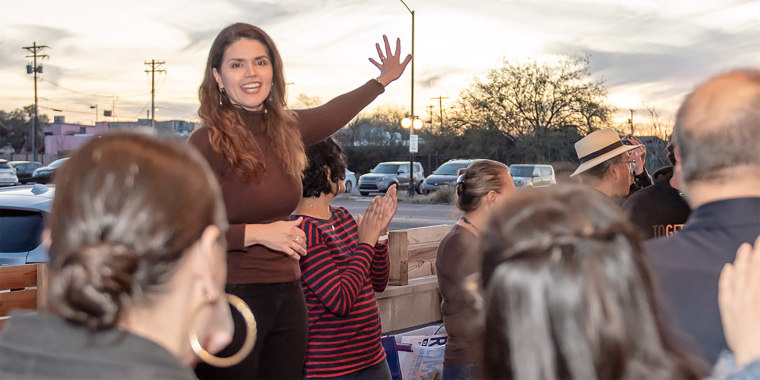Regina Romero, a councilwoman in Tucson, Arizona, beat back two Democratic challengers to become the party's mayoral candidate and be in position to potentially become the first Latina and the first woman to serve as the city's mayor.
Romero, 44, who was also the first Latina elected to the city council, will face an independent candidate in the Nov. 5 election. On Tuesday, she won almost 49.5 percent of the votes, while her main challenger Steve Farley got 37.7 percent and Randi Dorman finished with 12 percent.
While Arizona has historically been dominated by Republicans, Tucson is known as a relatively safe Democratic stronghold. No Republican ran in the primary, and Libertarian and Green Party candidates received only a few dozen votes each. Romero is a favorite to win in November.
Tucson has had a Latino mayor before — in 1875. Mexican American businessman Estevan Ochoa was elected mayor of the city when Arizona was still a territory.
Romero, according to her city of Tucson biography, is the youngest of six children and the first in her family to vote. She is the daughter of immigrants from Mexico and is an Arizona native.
She most recently has been working as the director of Latino engagement at the Tucson-based Center of Biological Diversity, an environmental and wildlife conservation organization. On her campaign site, she states that she is running because "we all deserve a safe, clean, just, and sustainable city that provides economic opportunity to all working families."
A political action committee connected to CHISPA, a Tucson environmental justice group focused on Latinos and a program of the League of Conservation Voters, had worked during the primaries to educate Latino voters on the disproportionate impact climate change has on them.
CHISPA’s Vianey Olivarria said the group's PAC backed Romero's mayoral bid and worked on her behalf to improve her name recognition and spread word about her experience in community service and her work on the city council.
"We support a candidate that puts community and environment first," the PAC said in a July endorsement. The group called her a "bold environmentalist" in a Facebook post after she won the primary Tuesday.
Tucson was not the only city with an election. Phoenix held a widely anticipated special election to determine the fate of its light rail. Proposition 105 was viewed by activists and Phoenix Mayor Kate Gallego as an attempt by corporate and outside interests to kill public transportation; the proposition called for prohibiting spending on light rail expansion.
The proposition lost by an almost 2-to-1 margin, with 62 percent of voters striking down the measure, and just under 38 percent supporting it. Latino precincts in Phoenix do not appear to have been a big factor in the special election.
Conservatives have sought to end light rail expansion, largely framing the project as economically unviable and one that would serve few people.
Those arguments have often been viewed by activists as opposition to investment in minority and poor communities.
With higher voter turnout and voter participation in Tucson and Phoenix, experts are wondering if these results portend a higher voter interest in Arizona politics.
Tucson and Phoenix make up a third of Arizona’s population and Phoenix has traditionally served as a weather vane for Arizona politics. Last year, Krysten Sinema, who is a Democrat, won the U.S. Senate election and Democrats took several statewide offices, including treasurer, secretary of state and the superintendent of public education.
Arizona’s federal delegation in Washington is majority Democratic, with five out of nine in the U.S. House being Democrats, along with Sen. Sinema.
Follow NBC Latino on Facebook, Twitter and Instagram.



